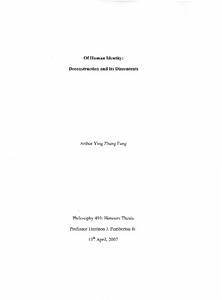| dc.rights.license | In Copyright | en_US |
| dc.creator | Fang, Arthur Ying Zhang | |
| dc.date.accessioned | 2023-10-20T17:40:35Z | |
| dc.date.available | 2023-10-20T17:40:35Z | |
| dc.date.created | 2007 | |
| dc.identifier | WLURG038_Fang_thesis_2007 | |
| dc.identifier.uri | https://dspace.wlu.edu/handle/11021/36382 | |
| dc.description.abstract | Why would Jacques Derrida and deconstruction so often evoke baseless and sweeping objections like those in the epigraph? Many students and academics find Derrida's works incomprehensible and even contradictory at times. But if deconstruction is really devoid of any philosophical worth as these critics put it, how do they account for deconstruction's contributions to linguistics, literary theory, feminism, performance studies, and so on? If Derrida's writings were indeed riddled with "false or trivial" claims, how could deconstruction play such a major role in many prominent areas of contemporary thought? It is absurd that Derrida is characterized as the anti-philosopher who trivializes philosophy with "tricks and gimmicks"; if anything, Derrida's career is dedicated to expanding the boundaries of philosophy into horizons that were rarely treaded before his time. Unlike the German or Anglo-American traditions, Derrida writes in a more flamboyant and less structural way because his style is meant to emphasize the element of "play" in his philosophy. Many critics also casually brush aside deconstruction without giving much substance and proof, and their excuse generally falls under the allegation that Derridian thought "does not meet accepted standards of clarity and rigour." John M. Ellis' Against Deconstruction is the most insightful attack on deconstruction by far. Although this book is helpful in offering an analytical account of how to critique deconstruction, Ellis unwittingly legitimizes deconstruction through his inability to refute it - his work only proves that that Derrida is a philosopher who positions himself in the margins of philosophy. Deconstruction's ability to be simultaneously inside and outside of philosophy has profound significance -- not only does it confirms Derrida's belief that, despite our best efforts, we can never escape certain aspects of human existence like logocentrism, the interpreting of deconstruction tells us much about who we are. This paper seeks to demonstrate the legitimacy and philosophical significance of deconstruction, and explore its implications on personal identity. [From Introduction] | en_US |
| dc.format.extent | 34 pages | en_US |
| dc.language.iso | en_US | en_US |
| dc.rights | This material is made available for use in research, teaching, and private study, pursuant to U.S. Copyright law. The user assumes full responsibility for any use of the materials, including but not limited to, infringement of copyright and publication rights of reproduced materials. Any materials used should be fully credited with the source. | en_US |
| dc.rights.uri | http://rightsstatements.org/vocab/InC/1.0/ | en_US |
| dc.subject.other | Washington and Lee University -- Honors in Philosophy | en_US |
| dc.title | Of Human Identity: Deconstruction and its Discontents | en_US |
| dc.type | Text | en_US |
| dcterms.isPartOf | WLURG038 - Student Papers | en_US |
| dc.rights.holder | Fang, Arthur Ying Zhang | en_US |
| dc.subject.fast | Deconstruction | en_US |
| dc.subject.fast | Philosophy | en_US |
| dc.subject.fast | Derrida, Jacques | en_US |
| local.department | Philosophy | en_US |
